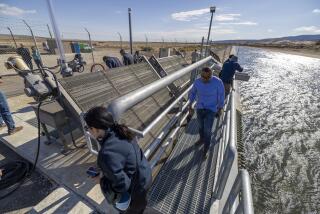Surplus Rocket Casings Help to Water Desert Wildlife
- Share via
SALT LAKE CITY — Some of the mule deer and antelope in the Utah desert are surviving thanks to space technology.
Hercules Corp. has donated more than 100 surplus motor casings for solid-fuel rockets to the state Division of Wildlife Resources since 1978 for a program that supplies water to animals in otherwise inhospitable areas.
The casings, nicknamed “guzzlers,” serve as underground cisterns. They capture and hold rainwater in areas that receive only 6 to 8 inches of precipitation a year. The water attracts wildlife to areas that otherwise might be avoided, said Jay Roberson, upland game coordinator for the division.
Each rocket casing is buried on public land beneath a funnel or catch basin that captures rain. A pipe or hose feeds the stored water to a trough through a valve that opens when animals drink.
The state still has to pay for other materials and install the guzzlers, but officials say the tanks generally are the most costly part of the system. The price can exceed $10,000.
“The state has saved over $400,000 by using the cases instead of buying new materials,” biologist Dean Mitchell said.
In the past, Hercules had to cut up surplus casings and send them to a landfill, said company engineer Richard Cloward, who is vice president of the Utah Wildlife Leadership Coalition.
“It’s crazy to spend money to cut those things up just to facilitate burying them,” he said.
John Waugman, environmental engineer at Hercules, said the huge casings are made of fiberglass, graphite or Kevlar, a material used in bulletproof vests. They’re usually stronger than steel.
“It doesn’t deteriorate,” Cloward said.
“It will be there long after you and I are gone,” added Waugman.
Hercules produces rocket motors for the Defense Department and the space program, including the Titan and Titan IV, Delta II, Trident II, the Midgetman small intercontinental ballistic missile and Pegasus.
Waugman said the donated casings were never filled with rocket fuel.
More to Read
Sign up for Essential California
The most important California stories and recommendations in your inbox every morning.
You may occasionally receive promotional content from the Los Angeles Times.













